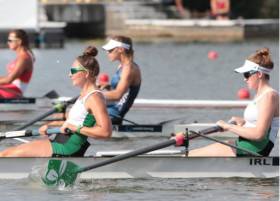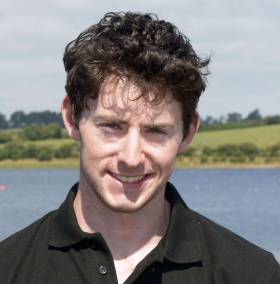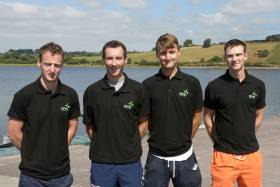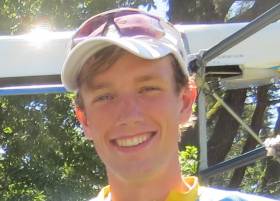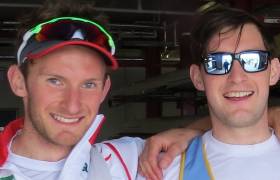Displaying items by tag: Ireland
#Rowing: Britain won the first race of the Coupe de la Jeunesse 2018 at the National Rowing Centre in Cork. The junior women’s eight, the traditional starting event for the event, featured five boats. Spain and France took the minor medals, while Ireland took fourth. The Coupe continues until Sunday.
Coupe de la Jeunesse, National Rowing Centre, Day One
Junior Women’s Eight – Final: 1 Britain 7:04.9, 2 Spain 7:07.1, 3 France 7:07.7; 4 Ireland (A Tyther, R O’Donoghue, C O’Sullivan, J Duggan, J Harrington, E Murphy, E Carney, C Nic Dhonncha; cox: V Hanlon) 7:15.5.
#Rowing: The Ireland women’s pair of Emily Hegarty and Tara Hanlon finished sixth in the semi-final at the World Under-23 Rowing Championships at Poznan, Poland. The race ran away from Ireland. Chile and then the United States, who would win, battled it out ahead of them, with Greece finishing brilliantly to take the third qualification spot for the A Final. Ireland lagged in sixth throughout and will compete in the B Final.
Hugh Sutton gave a gutsy performance in the C/D semi-final of the lightweight single sculls. He held third until the final 50 metres when he was passed by Marlon Colpaert of Belgium, who had just over half a second over him on the line. The Belgian take a C Final place and Sutton is set for the D Final.
World Under-23 Rowing Championships, Poznan, Poland
Men
Single Sculls – Quarter-Final (First Three to A/B Semi-Finals; rest to C/D Semi-Finals): 1 Ireland (R Byrne) 7:20.26.
Lightweight Single Sculls – Quarter-Final (First Three to A/B Semi-Finals; rest to C/D Semi-Finals): 5 Ireland (H Sutton) 7:55.8. C/D Semi-Final Two: 4 Sutton 7:42.69.
Women
Pair – Semi-Finals (First Three to A Final; rest to B Final) – Semi-Final One: 2 Britain (2 H Scott) 7:52.09. Semi-Final Two: 6 Ireland (E Hegarty, T Hanlon) 8:15.53.
#Rowing: Ireland’s Ronan Byrne won his quarter final of the men’s single sculls at the World Under-23 Rowing Championships in Poznan, Poland, taking a place in the A/B Semi-Finals. The UCC man was the clear leader right through, with Russia and Brazil slotting into the other qualification places for the last 12.
Hugh Sutton finished fifth in his quarter-final of the lightweight single sculls. The top three – Austria, South Africa and Germany – were established early, and Sutton held fifth through the race.
World Under-23 Rowing Championships, Poznan, Poland
Men
Single Sculls – Quarter-Final (First Three to A/B Semi-Finals; rest to C/D Semi-Finals): 1 Ireland (R Byrne) 7:20.26.
Lightweight Single Sculls – Quarter-Final (First Three to A/B Semi-Finals; rest to C/D Semi-Finals): 5 Ireland (H Sutton) 7:55.8.
#Rowing: Ireland’s lightweight quadruple scull of Miles Taylor, Niall Beggan, Ryan Ballantine and Andrew Goff won their repechage and moved into the A Final at the World Under-23 Championships in Poznan, Poland.
The Ireland crew would have gone through with first or second and they disputed the lead with Spain until half way. But Ireland hit that line first and went on to lead. Germany tried hard to push into the top two, but Spain rebuffed them, while Ireland had a one-length lead from Spain at the finish. Britain finished fourth.
Hugh Sutton also came through in his repechage. The 19-year-old raced well to take second and qualify for the quarter-finals of the lightweight single sculls. Four from six qualified. Early on, Egypt’s Omar Amer, who had made a false start, fell to the back of the race and stayed there throughout, while Turkey’s Enes Yenipazarli shot into a lead he would never lose. Sutton stayed in second for most of the race, swapping it with American Zachary Heese, but then beating him in a sprint in the closing stages.
The Ireland men’s and women’s lightweight double sculls had earlier made it directly through their heats.
World Under-23 Championships, Poznan, Poland (Irish interest; selected results)
Men
Lightweight Quadruple Sculls – Repechage (First Two to A Final; rest to B Final): 1 Ireland (M Taylor, N Beggan, R Ballantine, A Goff) 6:01.47, 2 Spain 6:04.02.
Lightweight Double Sculls – Heat Three (First to A/B Semi-Finals; rest to Repechage): 1 Ireland (F McCarthy, J McCarthy) 6:35.94.
Lightweight Single Sculls – Repechage (Top Four to Quarter-Finals; rest to E Final): 2 Ireland (H Sutton) 7:21.51
Women
Lightweight Double Sculls – Heat Four (First Two to A/B Semi-Finals; rest to Repechage): 2 Ireland (L Heaphy, M Cremen) 7:37.99.
#Rowing: Jake and Fintan McCarthy raced brilliantly to win their heat and qualify directly for the A/B Semi-Finals at the World Under-23 Rowing Championships in Poland this morning. There was just one direct qualification place on offer in this heat of the lightweight double sculls and Italy gave Ireland quite a race. The two crews were locked together as they approached the 1500-metre mark – but then the McCarthy twins went. They led by .18 of a second at 1500 metres and sprinted away from their rivals to win well.
Lydia Heaphy and Margaret Cremen made a solid start to their campaign in the women’s lightweight double by taking the second and final qualification spot in their heat. They were fastest to the 500 metre mark, but Britain’s Susannah Duncan and Danielle Semple took over from there. They would build their lead to win by almost eight seconds. Cremen and Heaphy secured their spot, staying well clear of third-placed Poland.
World Under-23 Championships, Poznan, Poland (Irish interest; selected results)
Men
Lightweight Double Sculls – Heat Three (First to A/B Semi-Finals; rest to Repechage): 1 Ireland (F McCarthy, J McCarthy) 6:35.94.
Women
Lightweight Double Sculls – Heat Four (First Two to A/B Semi-Finals; rest to Repechage): 2 Ireland (L Heaphy, M Cremen) 7:37.99.
#Rowing: David O’Malley and Shane Mulvaney produced an outstanding display to win their heat of the lightweight pair at the World Under-23 Championships at Poznan in Poland today. Germany led the race from the start, but the UCD men had grabbed a firm hold of it by 1,000 metres. They went on to win by 6.69 seconds from Chile, who pipped the Germans for second – a rank that mattered much less than the first place which put Ireland straight through to the final on Saturday.
The Ireland lightweight quadruple had to settle for third in a heat where only the top crew qualified for the A Final. The Ireland crew of Miles Taylor, Niall Beggan, Ryan Ballantine and Andrew Goff looked very good and led early on. The United States moved decisively in the second quarter, when they took a slight lead. They took control in the third. They won well from France, who beat Ireland in a sprint to the line.
Hugh Sutton finished fifth in his heat of the lightweight single sculls and is set for a repechage.
World Under-23 Championships, Poznan, Poland
Men
Lightweight Pair – Heat Two (Winner to A Final; rest to Repechage): 1 Ireland (S Mulvaney, D O’Malley) 6:50.92.
Lightweight Quadruple – Heat One (Winner to A Final; rest to Repechage): 1 United States 6:00.18; 3 Ireland (M Taylor, N Beggan, R Ballantine, A Goff) 6:04.62.
Lightweight Single Sculls (First Four to Quarter-Finals; rest to Repechage): 5 Ireland (H Sutton) 7:24.38.
#Rowing: Ireland won the senior men’s title at the Home International Regatta at the National Rowing Centre today.
The men’s senior eight sealed the deal with a terrific win over Scotland, their closest rivals in the race and on the points table. A win for Scotland would have given them the honours.
The Ireland senior women came very close to winning the overall prize. The women’s quadruple – in the same manner as the men’s - had won the previous race, and the senior women’s eight knew that a win in the eight would have tied the points with England, but secured the big prize by virtue of the win in this key race. However, England produced a fine performance to win.
In all, Ireland had 10 wins at the regatta: the men’s four and coxed four, the pair and the quadruple won, in addition to the eight. The women’s four and the pair won, as did single sculler Selma Bouanane – by under a third of a second from Fiona Bell of Queen’s, who was rowing for Scotland.
England were in charge in both the junior men’s and junior women’s events.
Home International Regatta, National Rowing Centre, Cork (Selected Results; Irish placings: All Irish results unless stated)
Overall
Men – Senior: Ireland 30 pts, Scotland 30, England 20, Wales 15. Ireland win on basis of eights’ win. Junior: England 26, Ireland 17, Scotland 14, Wales 13.
Women – Senior: England 27, Ireland 27, Wales 20, Scotland 18. England win on basis of eights’ win. Junior: England 26, Ireland 18, Scotland 16, Wales 6.
Men – Eight: 1 Sean O’Sullivan, C Hennessy, Stephen O’Sullivan, J Quinlan, P Munnelly, T Power, D Joyce, P Moreau; cox: C O’Connell 6:01.31, 2 Scotland 6:07.10, 3 England 6:07.71. Junior: 3 Ireland 6:15.55.
Four – 1 T Power, Sean O’Sullivan, Stephen O’Sullivan, C Hennessy 6:18.37. Jun: 3 M Campion, D Ryan, B Frohburg, S Daly 6:46.28.
Four, coxed: 1 P Munnelly, J Quinlan, C Murphy, N Herlihy; cox: C O’Connell 6:44.97. Jun: 3 J Kennedy, P Murphy, R Mills, M Stewart, C Wanjau 6:52.22.
Pair – 1 D Joyce, P Moreau 7:02.03
Lightweight: 3 M Farrell, C Flynn 7:21.01. Jun: 1 S O’Neill, W Ronayne 7:05.14.
Sculling, Quadruple: 1 D Larkin, A Christie, N Hull, K Mannix 6:12.48. Jun: 2 D Kelly, T Kelly, A Sheehan, L Flynn 6:24.19.
Double – 2 N Hull, A Christie 6:47.38.
Lwt: 2 C McCrae, C O’Connell. Jun: 3 T Orlic, S Byrne 7:03.41.
Single: 3 K Mannix 7:23.51.
Lightweight Single: 3 D Larkin 7:36.9.
Junior, Single: 3 L Sutton 7:47.798.
Women
Eight: 1 England 6:48.44, 2 Ireland 6:52.35, 3 Scotland 6:56.69. Junior: 2 Ireland 6:51.598.
Four: 1 D Maguire, C Dempsey, C Feerick, K Shirlow 6:58.83.
Jun: 3 Z McCutcheon, C Fee, N Silke, S Byrnes 7:21.29.
Four, coxed: 4 R Gilligan, R Ryan, A Corcoran, S Kelly; cox: A Reid 7:40.76. Jun: 3 A Brooks, C Kirwan, A Cummins, J Crowley, S Dolan 7:38.62.
Pair – 1 N Casey, A McCarthy 7:44.299. Lightweight: 4 E Brogan, K McCarthy 8:33.09. Junior: 2 R O’Donoghue, A Tyther 7:57.62.
Sculling, Quadruple; Senior: 1 S Bounane, G O’Brien, S Crummey, O Hayes 6:53.69. Jun: 2 N Kiely, S Tierney, K Dolan, S Scully 7:12.40.
Double – 2 G O’Brien, S Crummey 7:31.69. Lwt: 3 S Clavin, V Wallace 7:54.82. Jun: M Kidney, A Lynch 7:47.67.
Single: 1 S Bouanane 8:04.81. Lightweight Single: 2 O Hayes 8:24.7. Junior, Single: 2 C O’Brien 8:25.1
Ireland Team Chosen for Home International Rowing Regatta
#Rowing: The Ireland senior team for the 2018 Home International Regatta has been chosen. The event will be held at the National Rowing Centre next Saturday, July 21st. Ireland, England, Scotland and Wales will compete to win the Victor Ludorum – ‘the winner of the games’ – in four categories: senior men, senior women, junior men and junior women.
Irish crews had six wins at the 2017 regatta in Scotland and the junior men and junior women were both second overall. England won in all but one category, with Scotland beating them to the top of the senior women’s table.
For some Irish athletes, the Home International has been the pinnacle of their rowing career; for others a first step on the road to World and Olympic Championships. Gary and Paul O Donovan began their journey to Olympic medal glory in this regatta.
Racing begins at 10:00am on Saturday, and runs until 4pm that afternoon.
Senior Men’s Sculling Team:
Keelan Mannix (Skibbereen RC)
Aaron Christie (Bann RC)
Nathan Hull (Queens University Belfast BC)
Dara Larkin (UCC RC)
Callum Macrae (Methodist College Belfast RC)
Coman O’Connell (UCD BC)
Senior Men’s Sweep Rowing Team:
Patrick Munnelly / James Quinlan (NUIG BC / Castleconnell RC)
Tomas Power / Sean O’Sullivan (Cork BC)
Stephen O’Sullivan / Colm Hennessy (Shandon BC)
Patrick Moreau / David Joyce (Commercial RC)
Niall Herlihy / Cameron Murphy (UCD BC)
Michael Farrell / Conor Flynn (NUIG BC)
Cormac O’Connell (UCC RC) Cox
Senior Women’s ScullingTeam:
Selma Bouanane (Fermoy RC)
Georgia O’Brien (UL RC)
Sarah Crummey (Belfast BC)
Orla Hayes (Skibbereen RC)
Sheila Clavin (St Michaels RC)
Vikki Wallace (QUBBC)
Senior Women’s Sweep Team:
Niamh Casey / Aine McCarthy (Skibbereen RC)
Claire Feerick / Katie Shirlow (Neptune RC / Bann RC)
Caoimhe Dempsey / Dineka Maguire (DULBC)
Rachel Ryan / Ruth Gilligan (Commercial RC)
Sarah Kelly / Aoife Corcoran (DULBC)
Aoife Reid (Commercial RC) Cox
Womens Lightweight Pair
Ella Brogan, Queens University Boat Club
Katie McCarthy, Cork Boat Club
Junior Men’s Sculling Team:
Dara Kelly (Lee)
Thomas Kelly (Kenmare)
Andrew Sheehan (Lee)
Luke Flynn (Three Castles)
Tristan Orlic (Neptune)
Sean Byrne (Neptune)
Luke Sutton (New Ross)
Coach: Colm Butler (Neptune)
Junior Men’s Sweep Team:
Jack Kennedy (Enniskillen)
Peter Murphy (Enniskillen)
Robbie Mills (Enniskillen)
Michael Stewart (Enniskillen)
Cliff Wanjau (NUIG)
Michael Campion (Commercial)
Damien Ryan (Castleconnell)
Ben Frohburg (Castleconnell)
Sam Daly (Commercial)
Sam O’Neill (Shandon)
Will Ronayne (Shandon)
Junior Women’s Sculling Team
Marie Kidney (Lee)
Niamh Kiely (Castleconnell)
Clara O'Brien (Castleconnell)
Shona Tierney (New Ross)
Aoife Lynch (Lee)
Katie Dolan (Commercial)
Sadhbh Scully (Carlow)
Janet Walsh (New Ross)
Junior Women’s Sweep Team:
Aoife Brooks (Shandon)
Chris Kirwan (St. Michaels)
Rhianon O'Donoghue (Killorglin)
Anna Tyther (Killorglin)
Zoe McCutcheon (Enniskillen)
Caitlyn Fee (Enniskillen)
Aoife Cummins (Lee)
Jennifer Crowley (Lee)
Norma Silke (Castleconnell)
Saoirse Byrnes (Castleconnell)
Sarah Dolan (Enniskillen)
Puspure Takes Silver Medal at World Cup Rowing In Lucerne
#Rowing: Sanita Puspure took a silver medal for Ireland at the World Cup Regatta in Lucerne. The world champion, Jeannine Gmelin of Switzerland took gold, but only just, in a thrilling finish. Puspure was under pressure for second from Carling Zeeman of Canada, but the Ireland sculler has a great finish and pushed right up on Gmelin, finishing just .23 of a second behind her.
World Cup Regatta, Lucerne, Day Three (Selected Results; Irish interest)
Men
Pair – B Final (Places 7 to 12): 1 Spain Two 6:40.42; 3 Ireland (M O’Donovan, S O’Driscoll) 6:43.27.
Lightweight Double Sculls – A Final: 1 Ireland (G O’Donovan, P O’Donovan) 6:28.50, 2 Belgium 6:29.30, 3 Denmark 6:32.39.
Women
Pair – B Final: 1 Spain 7:25.23; 4 Ireland (A Keogh, T Hanlon) 7:32.46.
Double – B Final: 1 Czech Republic 7:05.30; 3 Ireland (M Dukarska, A Crowley) 7:06.92.
Single – A Final: 1 Switzerland (J Gmelin) 7:35.94, Ireland (S Puspure) 7:36.17, 3 Canada (C Zeeman) 7:37.03
Gold for O'Donovans at World Cup Regatta in Lucerne
#Rowing: Paul and Gary O’Donovan took gold at the World Cup Regatta in Lucerne this morning. Denmark and Belgium had good starts, but the Skibbereen men too over the lead after 800 metres. They held it from there, though Belgium pushed right up on them in the final quarter. The O’Donovans held them off to win by .8 of a second.
World Cup Regatta, Lucerne, Day Three (Selected Results; Irish interest)
Men
Pair – B Final (Places 7 to 12): 1 Spain Two 6:40.42; 3 Ireland (M O’Donovan, S O’Driscoll) 6:43.27.
Lightweight Double Sculls – A Final: 1 Ireland (G O’Donovan, P O’Donovan) 6:28.50, 2 Belgium 6:29.30, 3 Denmark 6:32.39.
Women
Pair – B Final: 1 Spain 7:25.23; 4 Ireland (A Keogh, T Hanlon) 7:32.46.
Double – B Final: 1 Czech Republic 7:05.30; 3 Ireland (M Dukarska, A Crowley) 7:06.92.


























